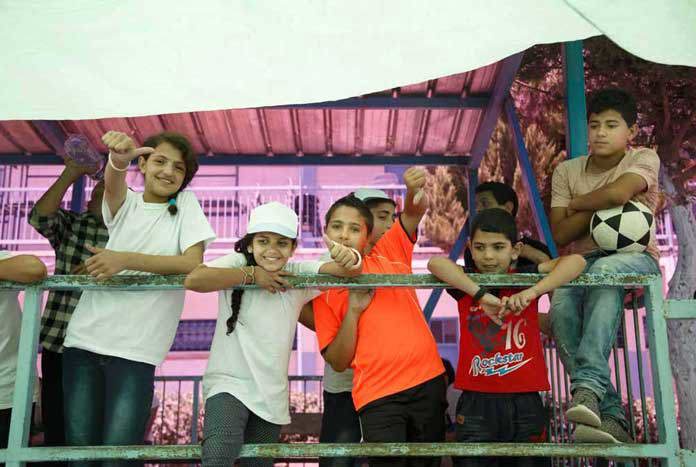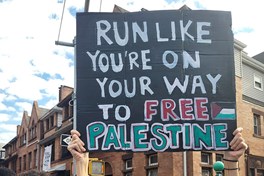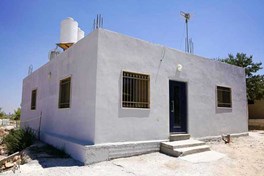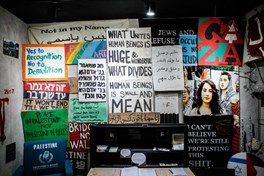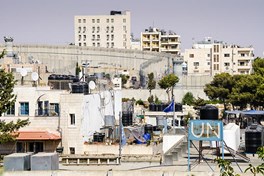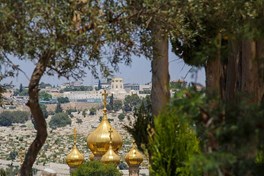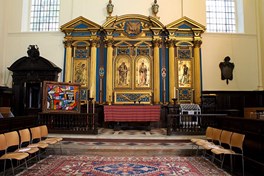United Nations Universal Children’s Day has been celebrated on 20th November each year, since 1954. UNICEF promotes and coordinates this special day, which aims to promote international togetherness, awareness among children worldwide and improve children’s welfare.
On the same date, in 1959, the United Nations General Assembly adopted the Declaration of the Rights of the Child — and then, in 1989, the Convention on the Rights of the Child.
So, 20th November seems as good a day as any to raise awareness of how Palestinian children, under the Israeli Occupation, are being denied their basic rights and, effectively, having their childhoods stolen from them by the occupation and the policies surrounding it. Ironically, Israel has been officially committed to the UN Convention on the Rights of the Child since 1991.
A good childhood is fundamental to a child’s sense of wellbeing. Evidence is now overwhelming that a good childhood really is the foundation for a healthy adult life and a cohesive society. Children’s wellbeing is crucial not only for their own lives but for society as a whole.”
Berry Street Childhood Institute
Let’s begin by establishing ‘what makes a good/happy childhood’?
After extensive research it became clear that the concept means many different things to many different people — psychologists, educationalists and parents cannot agree on a fixed set of criteria. However, there is a substantial degree of shared agreement on certain fixed conditions that create a baseline for childhood happiness and wellbeing (which are all included amongst the 54 articles making up the UN Convention on the Rights of the Child):
- love, care and commitment (in families and in the wider community)
- safety, security and protection
- justice and privacy
- play, relaxation and fun
- access to basic services (such as nutritious food, clean water and healthcare)
- access to an education
So, how are these core conditions being met for Palestinian children in the West Bank (including East Jerusalem) and Gaza — all living as refugees, under Israeli military occupation?
A child needs to feel from the very start that he or she is wanted and loved. They should grow up in the soil of affection and care… the building of self-confidence and self worth is everything”
Michael Morpurgo — author
Love, care and commitment
Let’s start with the good news. It is clear from visiting and spending time with families and communities in Palestine, that the vast majority of children are very much wanted and loved. They have the stable, caring relationships in their families and wider communities, which they need by the bucket-load to build resilience and help reverse the impacts of negative stress in other areas of their lives.
It is a true testament to parents’ and caregivers’ strength and resilience that their children show such openness and curiosity, are fun-loving, smiley and a delight to spend time with. Given that the adults have themselves grown up under occupation, with all the known psychological, financial and medical issues associated with this, they show tremendous inner strength in shielding their children and giving them a sense of true self-worth.
Sadly, this is where the good news ends. From what I have seen with my own eyes, and reading official reports from organisations working across Palestine (specifically towards human rights and the rights of children), the other conditions are constantly under threat as a direct result of the Israeli occupation and policies.
Safety, security and protection
UNICEF states that every child has the right to grow up in a safe and inclusive environment. An estimated 24,000 Palestinian homes have been demolished by the Israeli military. This policy of home demolitions violates international law. The impact for families is enormous and creates no safety or security for the children involved — imagine not even being safe in your own home.
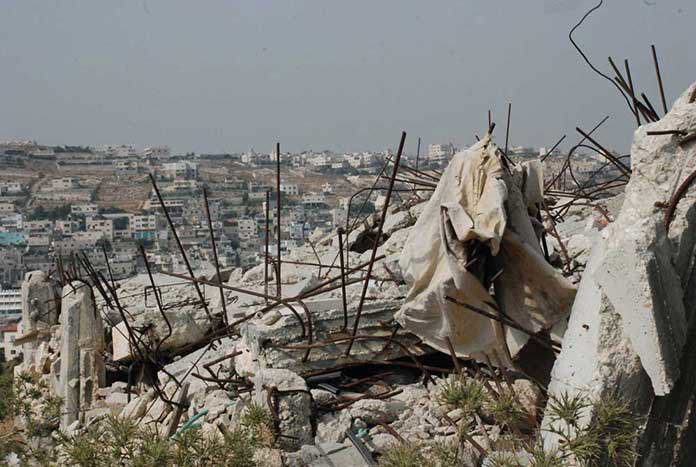
A demolished home in the Occupied West Bank
Amos Trust has a comprehensive rebuild programme which seeks to rebuild demolished Palestinian homes.
The military forces also carry out regular night raids across many of the refugee camps, where they can enter any property they like, getting children out of their beds, interrogating families and taking away family members for further questioning in detention centres. There is no way for Palestinian parents to protect their children or themselves from these terrifying ordeals.
In areas close to illegal Israeli settlements, there is also a continuous threat of regular violent harassment from the settlers against local Palestinian children, which again cannot be protected against without the penalty of being arrested for misconduct yourself.
Childhood… a precious time when children should live free from fear, safe from violence and protected from abuse and exploitation.” UNICEF
Justice and privacy
DCI-Palestine reports that, in the West Bank, child injuries and fatalities generally occur in the context of military raids, during ‘non-violent’ demonstrations or as a result of Israeli settler attacks. Further, children frequently sustain injuries when they are arrested, transferred and detained at interrogation centres. Allegations include the use of brute force, withholding food and water, violence and verbal aggression.
Children can be held for up to 90 days, without charge. It is not uncommon for any sustained injuries to be left untreated or for medical assistance to be denied — and families are limited to weekly visits with no physical contact allowed.
In Gaza, children are not arrested and detained of course, but rather they are shot with live ammunition on their own land. Between March-September 2018 there have been 179 Palestinian deaths in Gaza, including 29 children, and over 19,000 injured, all at the hands of the Israeli military.
Official statistics from the Ministry of Information in Ramallah show that between 2000-2013 Israel was directly responsible for the deaths of one Palestinian child every three days, for 13 years running. More recent figures are not available, but violence and especially the use of live ammunition have increased significantly in the last few years, so the figures will be much higher.
Since 2015, Israel has lowered the minimum age of criminal responsibility, allowing them to arrest, detain and charge Palestinian children as young as 12-years-old. The Israeli military court system has a 99% conviction rate, for Palestinians.
This follows a report in 2012, by a UK government-sponsored delegation of lawyers, finding Israel’s treatment of Palestinian children in military detention to be in breach of the Fourth Geneva Convention and the UN Convention on the Rights of the Child. Six years on and there has been just 1 out of 43 recommendations implemented.
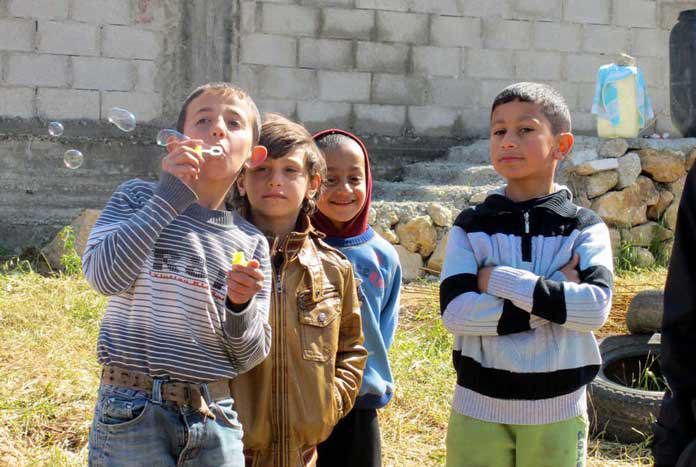
A group of young Palestinian children playing
A 2014 UNICEF report highlighted that children and young people (particularly refugee children in camp environments and children living in Area C in the West Bank) lack safe spaces for play and recreational activities.
Children need the freedom and time to play.
Play is not a luxury. Play is a necessity.”
Kay Redfield Jamison
Play, relaxation and fun
A 2014 UNICEF report highlighted that children and young people (particularly refugee children in camp environments and children living in Area C in the West Bank) lack safe spaces for play and recreational activities — due to limited space, funding and safety fears for children being in open spaces near watchtowers, Israeli settlements and checkpoints (where tear gas and live ammunition are readily used). Things we take for granted such as parks, playgrounds and football fields are scarce in Palestine as are the sounds of children playing, laughing and generally making a racket in the streets.
Thankfully, there are many amazing organisations creating ‘safe’ spaces for children to play, relax and have fun — and running community arts projects, theatre, dance, music, photography, etc. as an outlet for the young people. Examples include Amos’ partners Alrowwad Cultural Centre and Wi’am Conflict Resolution Centre, and another great organisation — Playgrounds for Palestine.
The children and young people with access to these amazing community ventures are encouraged to use their creativity as a platform through which they can build in confidence, express themselves freely and tell their stories — empowering them, raising awareness and preserving Palestinian traditional culture. It really is a joy to visit these incredible spaces and witness the positive effects they are having on the children in the communities they serve.
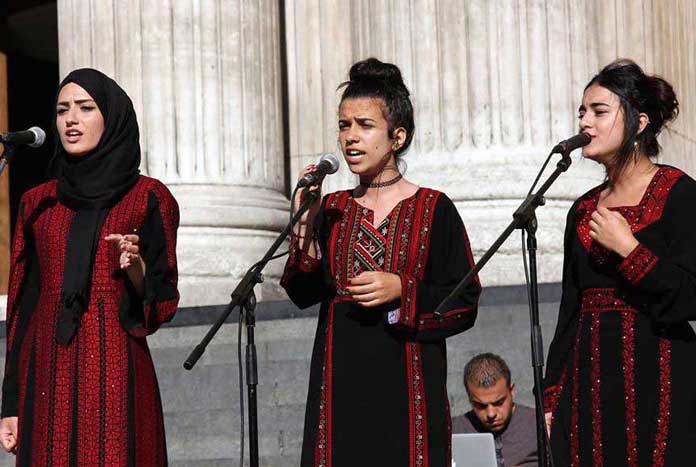
Beautiful Resistance
Young Palestinian women from Bethlehem singing on the steps of St Paul's Cathedral in London as part of the Alrowwad/Amos Trust ‘Beautiful Resistance’ tour in 2016.
Access to basic services
Children’s access to basic services is often limited by the presence of the Israeli military or by Israeli settlers. Freedom of movement is severely limited for those needing to travel for medical or dental care, either taking hours of waiting at checkpoints, being refused specific documents/permits, or simply being denied the right to travel beyond the camps’ entrance.
The IDF controls products in and out of many camps, including fuel, food, etc. They also control the movement of parents and older children seeking employment beyond the camps’ boundaries — which in turn is creating poverty for many families who are then unable to afford many of the basic services needed for their children.
If you visit Palestine you will instantly be aware of the large water storage tanks visible on the roofs of the buildings. These have become essential, as water and electricity supplies are controlled by Israel and are often restricted. Palestine is not short of water or electricity but Israel controls access to it and regularly cut off supplies to homes and businesses, without notice.
They have effectively created a manufactured water crisis in Palestine — whilst the Israeli settlements (illegally built on Palestinian land) have access to water 24 hours a day, 7 days a week (all taken directly from Palestine’s natural sources).
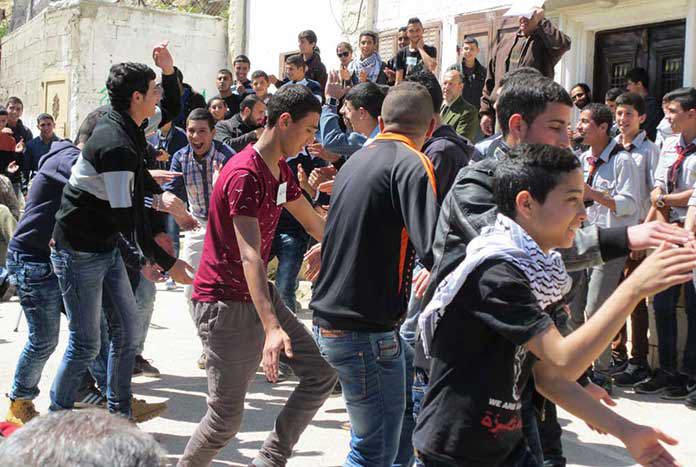
Dancing in the street
Amos Trust volunteers are welcomed at a rural school, in a refugee camp in Palestine, with a joyous, traditional dabke dance.
Access to an education
The Israeli occupation deliberately creates multiple obstacles for children seeking an education. Aside from the demolition of their schools, particularly in Gaza, there are many areas where children’s journeys to school are impeded. Short journeys to school can take hours, due to having to circumnavigate the separation wall and military checkpoints (where intimidation, assault or arbitrary arrests can take place).
Many children have to take longer routes than necessary to avoid settlers who harass and attack them. Older children are often not granted permits required to travel further afield for higher education purposes.
Thankfully, several organisations, such as UNICEF, are working with partners to provide protective presence/accompaniment for children and teachers to get to and from school safely. They are limited in what they can do due to budget restrictions and a lack of people willing to volunteer but have benefitted over 8,000 children so far in 2018.
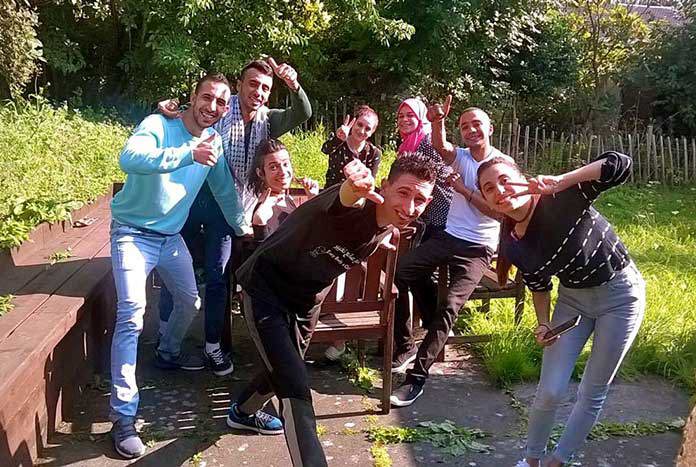
Palestine in the UK
A group of young Palestinian people posing for the camera on a visit to Scotland in 2016. Amos Trust is hoping to bring another group of young Palestinian refugees to the UK in 2019.
The above are just a few examples of the ways in which entire generations of Palestinian children are growing up without their needs and rights being met — and without hope or prospects for a bright future. Thinking back to the opening quote of this feature, one can only imagine how this type of childhood impacts on the children as they grow up and reach adulthood — and how this, in turn, affects the generations that follow and their communities as a whole.
As B’Tselem (the Israeli Information Centre for Human Rights in the Occupied Territories) state: “…ending Israel’s occupation is the only way to achieve a future that ensures human rights, democracy, liberty and equality to all people — Palestinian and Israeli alike… continued occupation is not an option”.
Great things are done by a series of small things brought together.”
Vincent Van Gogh
So, while we wait for the international community to bring an end to this terrible situation, let’s commit to carrying out a series of small things. I'm asking 100 people to donate just £10 each, to help make some happy childhood memories. All funds need to be received by 30th November so we can transfer the money to the trip organisers in time for Christmas.
Thank you.
— — — — — — — —
Sources:
Information is taken from official reports from DCI-Palestine, UNICEF, B’Tselem and EAPPI.

